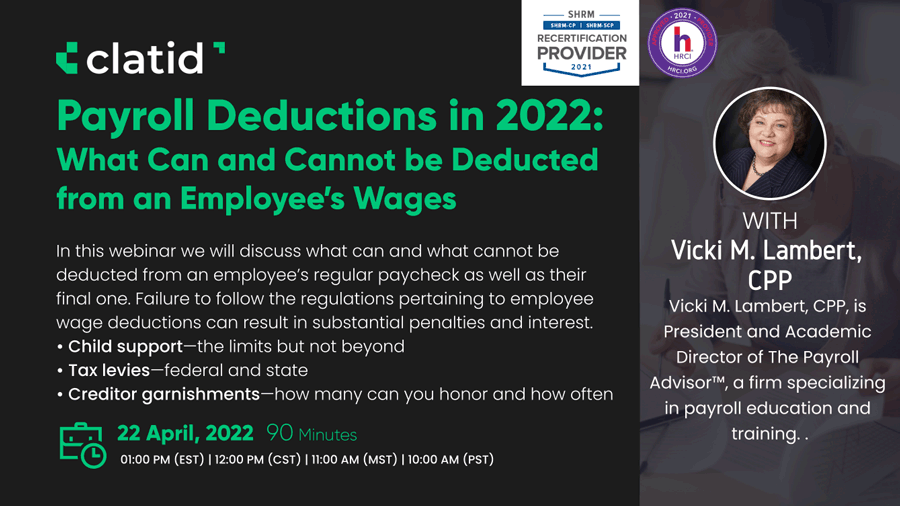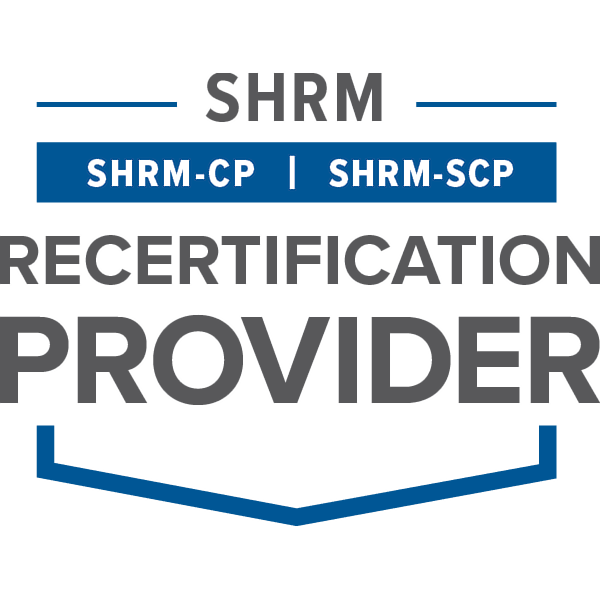- Topics
- Webinars
- Products & Services
- Customer Help
- Resources



In payroll, we calculate the gross wages of an employee by meticulously following strict regulations on what must be or must not be counted as hours worked and taxable income. We pay the employee their net paycheck only by the payment method that is permitted. But what about in between? When it comes to deducting from the employee’s gross wages to achieve the net income are you also adhering strictly to the rules?
After calculating gross wages for an employee is accomplished, much more difficult decisions must be made. What must an employer deduct from an employee’s wages? What can be deducted legally? What can never be deducted? These questions and more must be answered correctly before processing that paycheck. And if this is the employee’s final check…the rules may change! Handling deductions is a complex task that payroll must get right every time for every payroll check. Failure to deduct the proper taxes could result in penalties on the employer from the IRS but making an illegal deduction for a fringe benefit or for collecting an overpayment can get the employer a visit from the federal Department of Labor auditor, the state department of labor auditor or both! Sometimes the federal government will allow the deduction but that certain states won’t.
In this webinar, we will discuss what can and what cannot be deducted from an employee’s regular paycheck as well as their final one. Failure to follow the regulations pertaining to employee wage deductions can result in substantial penalties and interest.
-Taxes—which are mandatory, which are a courtesy, and which ones the employee controls
-Child support—the limits but not beyond
-Tax levies—federal and state
-Creditor garnishments—how many can you honor and how often
-Voluntary wage assignments for “payday loans”—when are they required to be honored
-Handling fringe benefits such as health insurance or group term life
-Uniforms—when the employer pays for it and when the employee furnishes it
-Meals—when they become part of the employee’s wages
-Lodging—when it is part of the employee’s wages and when is it a perk
-Shortages—the employee came up short, so they must cover that right?
-Breakage—you broke it, so you have to pay for it, legal or not?
-Overpayments—the employee was overpaid so you can just take the money back, or can you?
-Advanced vacation pays—the employee knows the vacation hours were advanced so we can take them back when the employee quits, can’t we?
-Loans to employees: what terms can be set while the employee is still active and what can be taken when the employee terminates
-Employee purchases—active employees and terminated employees
-Anti-wage theft laws and the states
Strict regulations apply to calculating an employee’s gross wages, particularly regarding what is counted as “hours worked” and “taxable income”. When deducting from an employee's gross wages to determine net income, an employer must adhere to the regulations or risk being subject to penalties and interest, which can add up to significant amounts. In this webinar, you will learn how to protect your company while complying with wage deduction laws. We will focus primarily on federal laws and general legal principles that apply to all (or most) states and may use some specific state examples as well. And will offer you insight into how to protect your company and stay compliant with laws regarding employee wage deductions.
-Payroll Executives/Managers/Administrators/Professionals/Practitioners/Entry LevelPersonnel
-Human Resources Executives/Managers/Administrators
-Accounting Personnel
-Business Owners/Executive Officers/Operations and Departmental Managers
-Lawmakers
-Attorneys/Legal Professionals
-Any individual or entity that must deal with the complexities and requirements of paying employees

With nearly 40 years of hands-on experience in all facets of payroll
functions as well as over three decades as a trainer and author, Ms. Lambert
has become the most sought-after and respected voice in the practice and
management of payroll issues. She has
conducted open market training seminars on payroll issues across the United
States that have been attended by executives and professionals from some of the
most prestigious firms in business today.
A pioneer in electronic and online education, Ms.
Lambert produces and presents payroll-related audio seminars, webinars, and
webcasts for clients, APA chapters, and business groups throughout the country.
Ms. Lambert is an adjunct faculty member at Brandman University in Southern
California and is the creator of and instructor for their Practical Payroll
Online program, which is approved for recertification hours by the APA. She is
also the instructor for the American Payroll Association’s “PayTrain” online program
also offered by Brandman University.
Clatid is recognized by SHRM to offer Professional Development Credits (PDCs) for the SHRM-CPSM or SHRM-SCPSM. This program is valid for 1.5 PDCs for the SHRM-CPSM or SHRM-SCPSM. For more information about certification or recertification, please portal.shrm.org.
Clatid Webinar Certification - Clatid rewards you with Clatid Achievement Certification for unlocking and attending this webinar. It is to acknowledge your participation in this training session and to add more to your professional score.
Clatid Courses and Webinar or any Education published "Articles & Materials" strictly follows the standards and guidelines of the Professional Credit / CEU Providers and Well Researched before publishment.
Clatid doesn't support any Fake - News, Articles, or Compliance updates; Our Industry Experts are highly verified and recognized, and their Pre-publishment is verified via our experts and fact-checkers.
Sign up now on clatid.io. Visit clatid.io/webinar to discover a wide range of webinars from industry specialists. Tick on either ‘live webinar’ or ‘on-demand’, and simply click on ‘buy now’ to get enrolled.
You can refer Clatid to anyone in your social circle. Explore your industry with your colleagues by getting them signed up on clatid.io today!
Go for the topic of your keen interest on clatid.io. Tick on ‘live webinar’ and get enrolled! Easy registration, transparent transaction.
You can request for an on-demand webinar that records the live webinar for you. After the webinar ends, you will have full access to the webinar’s recording. You can also explore Clatid offline to order your webinar DVDs, flash drives and transcripts.
If you can’t attend the live webinar, simply go for the ‘on-demand webinar’ for the same price! Now, the live webinar recording will be saved in a cloud storage for you to access anytime from anywhere.
Clatid offers both hard and soft copies of the webinars. It contains all the highlights as well as comprehensive descriptions of the webinar, so you never miss out a single detail.
After attending the live webinar, your certificate will be emailed to you. You can download it and add more charm to your professional score.
At the end of each webinar, you have the opportunity to interact with your industry experts, where you will get answers to all your queries.
Can’t attend the live webinar? Clatid has got you covered! You can always switch to the on-demand webinar from your portal. You can also get your hands on the webinar’s DVD/flash drive and transcript. So order them now!
Clatid brings a variety of options for offline learning. Order your DVDs, flash drives or transcripts now to have a lifetime access to Clatid webinars. You can also go for on-demand recordings. Download and watch it anytime from anywhere in the world!


